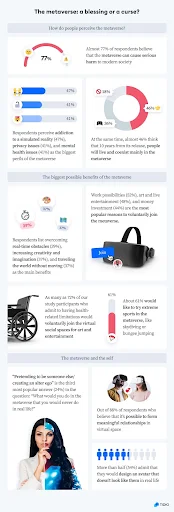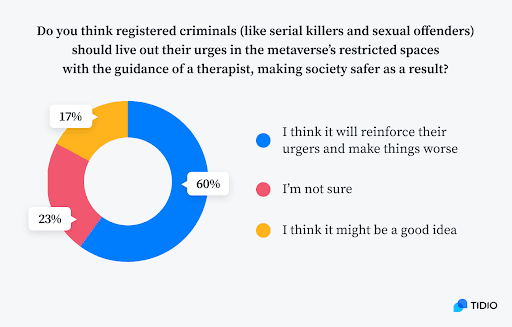Tidio recently conducted a consumer survey, looking to gauge the overall response people have to Meta’s upcoming social media experience, eponymously titled the Metaverse. The answers provide a mixed bag of expectations and caution.
Well, the company formerly known as Facebook is really going all out with its introduction and implementation of the Metaverse, going so far as to name itself Meta in the process as well. Weird, sure, but again: props to the amount of dedication that the Meta higher-ups are showing. For those completely unaware, the Metaverse combines all of the separate platforms that Facebook had previously acquired in the interest of attempting something new and interesting. By utilizing Oculus and its expertise with VR technology, then introducing concepts from the likes of Instagram or WhatsApp, the Metaverse is essentially gearing up to be an online, virtual social media experience. CEO Mark Zuckerberg even changed his company’s name to Meta in anticipation of the success that he is apparently confident will come by the Metaverse’s way. Honestly, it does seem like a pretty solid idea. I’ve been pretty vocal about how I believe tech like the Metaverse is reminiscent of the sort of future that movies such as Back to the Future or Total Recall envisioned for humanity. It’s an ideology that’s also stuck with current generations, and might very honestly lead to this VR open world chatroom being incredibly compelling for users to join.
However, personal opinions are just that: personal and, therefore, susceptible to personal bias. What does the general public think about the Metaverse, and do they believe that this virtual world has a future? Well, that’s where Tidio comes in. The firm specializes in providing customer service oriented platforms and tools to other interested businesses or startups, and is therefore a pretty good candidate for conducting such a consumer-based research. Surveying 1,050 individuals of varied ages and genders, all of whom were collected from Reddit via the Amazon Mechanical Turk, Tidio asked a few questions geared around gathering information about public perception to the Metaverse. The results ended up being a rather mixed bag. While individuals did show optimism in terms of seeing the Metaverse actively running years ahead of our time, they were also concerned about the potential harm such a platform brings. With all that out of the way, let’s directly get down to breaking down the data and numbers.
A rather significant 77% of the sample population actively believes that the Metaverse will prove harmful to its users. Of those 77%, common potential issues cited were addiction to the simulated virtual world (46%), a sharp increase in privacy issues (41%), and potential mental health ailments (41%). It’s a rather worrying outlook that the population is painting for Metaverse and its potential future. However, how many users even believe that the currently unreleased platform will even have one? Well, turns out that 46% of the population believes that users will heavily co-exist and function on virtual platforms in ten years’ worth of time, with only 18% of the population claiming that nothing of the sort will happen. Those aren’t perhaps the best numbers, but Meta’s probably pretty happy about the potentially addictive qualities of its platform. It’s not like the company particularly cares for its userbase.
There are some good things that users expect from the Metaverse as well. 72% of individuals have admitted to health related issues that they believe would be mitigated at least within the virtual world. 52% of the population sees a lot of potential in terms of conducting online work, 37% of the population would like to use the technology to virtually travel across the globe, and 61% would love trying out extreme sports such as bungee jumping or skydiving within the safety of virtual confines.
So, there’s some good to be expected, and there’s some bad to be expected. Just like every other new thing or concept, right? The ball is now in Meta’s court, and let’s hope they don’t fumble.
Take a look at below charts and graphics for more insights:
Read next: How Gen X have quickly adapted to the evolving world of technology
Well, the company formerly known as Facebook is really going all out with its introduction and implementation of the Metaverse, going so far as to name itself Meta in the process as well. Weird, sure, but again: props to the amount of dedication that the Meta higher-ups are showing. For those completely unaware, the Metaverse combines all of the separate platforms that Facebook had previously acquired in the interest of attempting something new and interesting. By utilizing Oculus and its expertise with VR technology, then introducing concepts from the likes of Instagram or WhatsApp, the Metaverse is essentially gearing up to be an online, virtual social media experience. CEO Mark Zuckerberg even changed his company’s name to Meta in anticipation of the success that he is apparently confident will come by the Metaverse’s way. Honestly, it does seem like a pretty solid idea. I’ve been pretty vocal about how I believe tech like the Metaverse is reminiscent of the sort of future that movies such as Back to the Future or Total Recall envisioned for humanity. It’s an ideology that’s also stuck with current generations, and might very honestly lead to this VR open world chatroom being incredibly compelling for users to join.
However, personal opinions are just that: personal and, therefore, susceptible to personal bias. What does the general public think about the Metaverse, and do they believe that this virtual world has a future? Well, that’s where Tidio comes in. The firm specializes in providing customer service oriented platforms and tools to other interested businesses or startups, and is therefore a pretty good candidate for conducting such a consumer-based research. Surveying 1,050 individuals of varied ages and genders, all of whom were collected from Reddit via the Amazon Mechanical Turk, Tidio asked a few questions geared around gathering information about public perception to the Metaverse. The results ended up being a rather mixed bag. While individuals did show optimism in terms of seeing the Metaverse actively running years ahead of our time, they were also concerned about the potential harm such a platform brings. With all that out of the way, let’s directly get down to breaking down the data and numbers.
A rather significant 77% of the sample population actively believes that the Metaverse will prove harmful to its users. Of those 77%, common potential issues cited were addiction to the simulated virtual world (46%), a sharp increase in privacy issues (41%), and potential mental health ailments (41%). It’s a rather worrying outlook that the population is painting for Metaverse and its potential future. However, how many users even believe that the currently unreleased platform will even have one? Well, turns out that 46% of the population believes that users will heavily co-exist and function on virtual platforms in ten years’ worth of time, with only 18% of the population claiming that nothing of the sort will happen. Those aren’t perhaps the best numbers, but Meta’s probably pretty happy about the potentially addictive qualities of its platform. It’s not like the company particularly cares for its userbase.
There are some good things that users expect from the Metaverse as well. 72% of individuals have admitted to health related issues that they believe would be mitigated at least within the virtual world. 52% of the population sees a lot of potential in terms of conducting online work, 37% of the population would like to use the technology to virtually travel across the globe, and 61% would love trying out extreme sports such as bungee jumping or skydiving within the safety of virtual confines.
So, there’s some good to be expected, and there’s some bad to be expected. Just like every other new thing or concept, right? The ball is now in Meta’s court, and let’s hope they don’t fumble.
Take a look at below charts and graphics for more insights:
Read next: How Gen X have quickly adapted to the evolving world of technology










